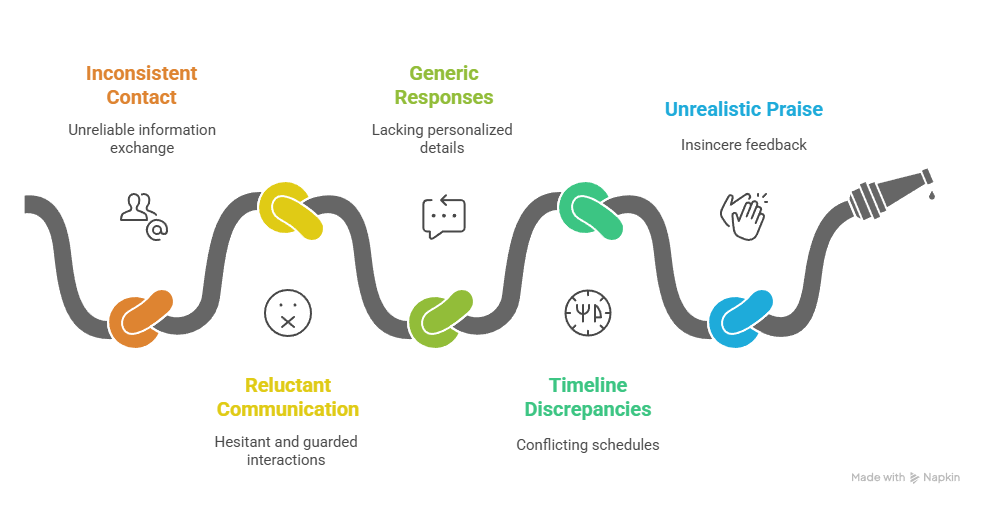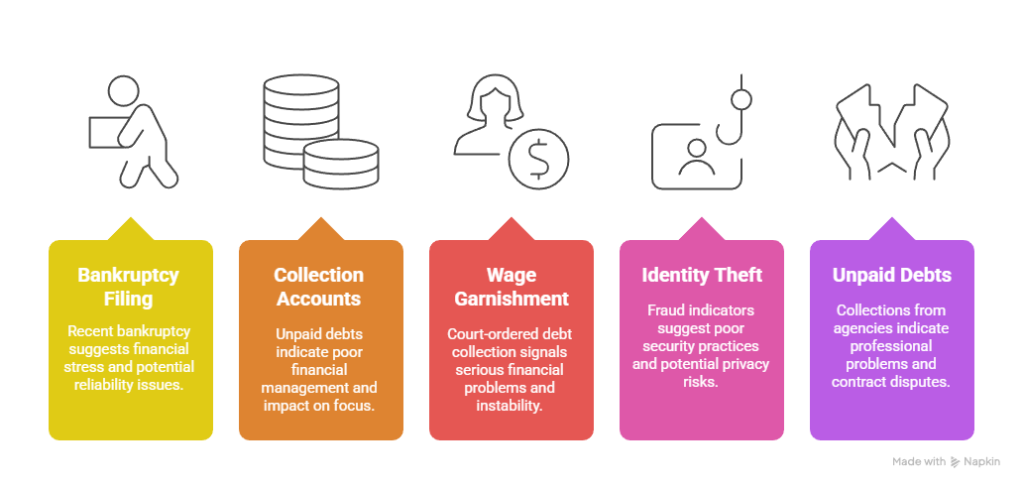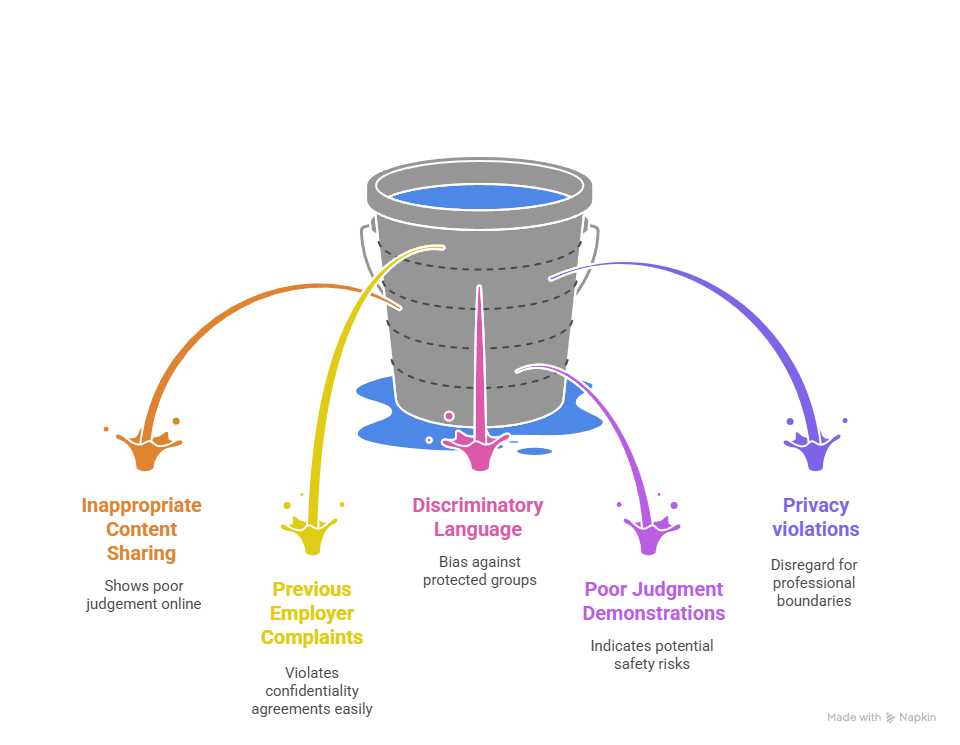Identifying nanny background check red flags is crucial for protecting your family, as approximately 23% of childcare applications reveal disqualifying criminal history or deceptive information according to 2024 screening industry data. Understanding these warning signs nanny background check patterns can prevent hiring decisions that compromise child safety and family security.
Key Takeaways
- Criminal history patterns: Multiple minor offenses often indicate poor judgment more than single serious incidents, requiring careful risk assessment evaluation.
- Employment verification gaps: Unexplained periods longer than six months in childcare history frequently correlate with undisclosed terminations or performance issues.
- Reference inconsistencies: When references cannot verify specific dates, responsibilities, or provide vague responses, this suggests potential fabrication or problematic employment relationships.
- Educational credential discrepancies: Falsified certifications in CPR, first aid, or early childhood education create liability risks and indicate broader honesty concerns.
- Motor vehicle violations: DUI convictions, reckless driving patterns, or suspended licenses pose direct safety risks when nannies transport children.
- Financial instability indicators: Recent bankruptcies, wage garnishments, or significant debt may create vulnerability to theft or financial desperation affecting job performance.
Understanding Critical Criminal History Red Flags
When reviewing nanny background check results, certain criminal patterns demand immediate attention and careful consideration. Drug-related offenses, particularly recent convictions within five years, represent significant concerns for childcare positions. Violence against children, domestic abuse charges, or any crimes involving minors create absolute disqualification scenarios that no parent should overlook.
The severity and recency of criminal activity matters significantly in risk assessment decisions. A single DUI conviction from eight years ago may be less concerning than multiple recent traffic violations or substance-related incidents. Additionally, financial crimes like fraud, theft, or embezzlement raise questions about trustworthiness in homes with valuable possessions. These patterns often indicate broader judgment issues that extend beyond the specific criminal behavior documented in background reports.
Violent Crime Considerations
Any history of assault, battery, or violent criminal behavior creates immediate safety concerns for families. These offenses demonstrate potential for physical harm and poor impulse control under stress.
Child abuse, neglect, or endangerment charges represent absolute disqualifiers regardless of circumstances or time elapsed. Even allegations without convictions warrant serious consideration given the stakes involved in childcare decisions.
Substance-Related Violations
Drug possession, distribution, or manufacturing charges indicate potential ongoing substance abuse issues that compromise judgment and reliability. Recent DUI convictions raise concerns about decision-making capabilities and potential for impaired supervision of children. Moreover, substance abuse often correlates with other behavioral problems, financial instability, and unreliable work performance that directly impact childcare quality.
Employment History Warning Signs That Signal Problems
Unexplained gaps in employment history often hide problematic terminations, performance issues, or periods of incarceration that candidates prefer not to disclose. Short-term positions lasting less than six months across multiple childcare roles suggest potential behavioral problems, unreliability, or conflicts with previous families. Furthermore, vague job descriptions or responsibilities that don't align with typical nanny duties may indicate exaggerated experience or different types of work altogether. Professional nanny agencies report that approximately 31% of employment verification attempts reveal discrepancies between claimed and actual job responsibilities or employment dates.
| Warning Sign | Risk Level |
| Employment gaps over 6 months | Medium |
| Three or more jobs under 6 months each | High |
| Vague job responsibilities | Medium |
| Cannot provide employer contacts | High |
| Dates don't match references | High |
Employment verification should include confirmation of start and end dates, job duties, reason for leaving, and eligibility for rehire status. This systematic approach helps identify what disqualifies someone from being a nanny through patterns of problematic work history.
Reference Verification Issues
Professional references who cannot provide specific examples of the candidate's childcare skills, emergency handling, or daily routine management may indicate superficial relationships or fabricated connections. References limited to personal friends or family members rather than former employers signal potential professional relationship problems.

- Inconsistent contact information
- Reluctant communication patterns
- Generic responses without specifics
- Timeline discrepancies
- Unrealistic praise without balance
Quality references provide balanced, detailed feedback about strengths and growth areas while confirming specific employment details. These conversations should reveal concrete examples of how candidates handled challenging situations and interacted with children.
Financial Background and Credit History Concerns
Financial distress indicators in credit reports may suggest vulnerability to theft or desperate financial situations that compromise professional judgment. Recent bankruptcies, significant unpaid debts, or wage garnishments create potential motivations for inappropriate financial behavior in employer homes. While credit history alone shouldn't disqualify candidates, patterns of financial irresponsibility combined with other red flags warrant careful consideration.

- Recent bankruptcy filing: Financial stress may create temptation for theft or desperate decision-making that affects job performance and reliability in household management situations.
- Multiple collection accounts: Unpaid debts suggest poor financial management skills and potential ongoing stress that could impact focus and decision-making abilities during childcare responsibilities.
- Wage garnishment history: Court-ordered debt collection indicates serious financial problems and potential legal complications that may interfere with work reliability and professional stability.
- Identity theft indicators: Multiple credit inquiries or accounts suggest possible fraud involvement or poor personal information security practices that could extend to employer household privacy.
- Unpaid childcare business debts: Collections from previous nanny agencies or families indicate professional relationship problems and potential disputes about job performance or contract violations.
Understanding these financial warning signs nanny background check patterns helps parents make informed decisions about candidate trustworthiness. Financial responsibility often correlates with general reliability and judgment in professional relationships.
Education and Certification Verification Issues
Falsified educational credentials or certifications represent serious honesty concerns that extend beyond simple qualification misrepresentation. Candidates claiming degrees from non-existent institutions, fabricated CPR certifications, or early childhood education qualifications they don't possess demonstrate willingness to deceive employers about fundamental qualifications. These verification failures indicate broader integrity issues that may manifest in other areas of employment.
Common Credential Discrepancies
The National Registry of Emergency Medical Technicians reports that approximately 12% of CPR certification verifications reveal expired or invalid credentials among childcare applicants. First aid, CPR, and specialized childcare certifications require current status for liability protection and emergency response capabilities. Educational institutions maintain records that should match candidate claims exactly regarding graduation dates, degree types, and program completion.
| Credential Type | Verification Method | Red Flag Indicators |
| CPR Certification | Direct registry contact | Expired or non-existent credentials |
| College Degrees | Institution registrar | Unaccredited schools or false dates |
| Childcare Training | Program administrators | Fabricated course completion |
Verification should include direct contact with educational institutions and certification bodies rather than relying solely on candidate-provided documentation. This thorough approach ensures authentic qualifications and identifies potential deception early in the hiring process.
Professional Development Claims
Many candidates exaggerate continuing education or specialized training to enhance their qualifications for competitive positions. Verification of workshops, seminars, or additional certifications often reveals inflated claims or complete fabrication of professional development activities.
Claims about specialized training in areas like autism support, behavioral management, or infant care require documentation from legitimate educational providers. Furthermore, candidates may misrepresent the depth or duration of training programs to appear more qualified than their actual experience warrants.
Motor Vehicle and Transportation Safety Violations
Driving record analysis reveals critical safety information when nannies will transport children to activities, school, or medical appointments. Multiple moving violations, suspended licenses, or DUI convictions create direct physical risks to children under their care. Insurance companies often refuse coverage for drivers with serious violations, creating additional liability concerns for employing families. Reckless driving patterns, speed violations, or accident history indicate poor judgment and risk-taking behavior that extends beyond driving situations.
| Violation Type | Disqualification Risk | Insurance Impact |
| DUI or DWI conviction | High | Often uninsurable for commercial use |
| Reckless driving charges | Medium-High | Significant rate increases likely |
| Multiple speeding violations | Medium | Coverage restrictions possible |
| License suspension history | High | Immediate coverage unavailable |
| At-fault accident patterns | Medium | Premium increases and scrutiny |
Understanding these transportation-related red flags helps parents make informed decisions about nanny candidates who will have driving responsibilities. Current valid licensure and clean driving records become essential qualifications for positions requiring child transportation responsibilities.
Social Media and Digital Footprint Analysis
Online presence evaluation reveals behavioral patterns, judgment quality, and potential lifestyle factors that impact professional childcare suitability. Social media profiles displaying excessive alcohol consumption, drug use, or inappropriate content suggest poor decision-making that may extend to professional responsibilities. Public posts about previous employers, families, or children violate confidentiality expectations and indicate potential privacy breaches. Digital footprint analysis should focus on publicly available information rather than invasive privacy violations, maintaining legal and ethical boundaries during candidate evaluation.

- Inappropriate content sharing: Photos or posts involving excessive drinking, drug use, or sexual content that demonstrates poor judgment and unprofessional behavior patterns.
- Previous employer complaints: Public criticism of families, children, or working conditions that violates confidentiality and suggests potential future privacy violations with new employers.
- Discriminatory language: Posts expressing bias against racial, religious, or other protected groups that could affect treatment of children from diverse backgrounds or family situations.
- Poor judgment demonstrations: Documentation of illegal activities, dangerous behavior, or irresponsible decisions that indicate potential safety risks in childcare supervision scenarios.
- Privacy violations: Sharing identifiable information about previous employers' children or families that demonstrates disregard for professional boundaries and confidentiality requirements.
Social media screening should complement rather than replace traditional background verification methods. Digital behavior patterns provide insights into judgment, discretion, and professionalism when combined with other assessment tools.
Professional Boundary Assessment
Candidates who maintain appropriate professional boundaries online typically demonstrate similar discretion in employment relationships. Conversely, those who share personal details excessively or engage in public conflicts may struggle with appropriate workplace behavior and family privacy expectations.
Creating a Comprehensive Risk Assessment Framework
Developing systematic evaluation criteria helps parents weigh multiple red flags against positive qualifications and specific family needs. Single minor issues may not disqualify excellent candidates, while multiple concerning factors create cumulative risk that outweighs other qualifications. Professional screening services recommend scoring systems that assign weight values to different types of violations or concerns. Risk tolerance varies among families based on children's ages, special needs, supervision requirements, and parental comfort levels with various issues.
Documentation of decision-making processes protects families legally and ensures consistent evaluation standards across multiple candidates. Recording which factors influenced hiring decisions, how concerning information was weighted, and what additional safeguards were implemented creates accountability and reference points for future hiring needs. This systematic approach transforms subjective feelings into objective, defensible employment decisions. The decision-making framework should include consultation opportunities with legal professionals, particularly when candidates have criminal history or other significant concerns that require careful risk evaluation. Employment law experts provide guidance on fair hiring practices, discrimination avoidance, and liability protection strategies that become especially valuable in complex legal environments.
Conclusion
Identifying red flags in nanny background checks requires systematic evaluation of criminal history, employment patterns, reference quality, and professional qualifications to ensure child safety and family security. These warning signs serve as crucial indicators of potential problems, but must be balanced against positive qualifications and specific family needs through comprehensive risk assessment frameworks. Parents who understand these critical evaluation criteria make more informed hiring decisions that protect their children while maintaining fair employment practices. Professional guidance from screening services and legal experts provides additional protection when complex issues arise during the evaluation process.
Frequently Asked Questions
What criminal charges automatically disqualify someone from being a nanny?
Child abuse, sexual offenses against minors, violent crimes involving children, and recent drug trafficking convictions create absolute disqualification scenarios for nanny positions. These charges indicate direct risks to child safety that cannot be mitigated through supervision or other safeguards.
How far back should nanny background checks look for criminal history?
Most professional background checks examine criminal history for 7-10 years, though serious felonies and sex offenses may appear regardless of timeframe. Recent violations within 3-5 years carry more weight than older infractions when assessing current risk levels.
Can nannies with DUI convictions still be hired for non-driving positions?
DUI convictions don't automatically disqualify nannies from positions without driving responsibilities, but parents should consider judgment implications and ensure job duties never include child transportation. Multiple DUI offenses or recent violations raise more serious concerns about decision-making capabilities.
What should parents do if a nanny background check reveals minor red flags?
Minor concerns should be discussed directly with candidates to understand circumstances, obtain explanations, and assess honesty in addressing issues. Additional safeguards like increased supervision, restricted responsibilities, or regular check-ins may mitigate lower-level risks.
How can parents verify if a nanny background check company is reliable?
Choose background screening companies with FCRA compliance, industry accreditation, and transparent reporting processes that explain search methodologies and limitations. Verify that companies access appropriate databases and provide detailed source information for reported findings.
Are parents legally required to perform background checks on nannies?
Legal requirements vary by state and employment type, but most jurisdictions don't mandate background checks for private household employees. However, liability protection and insurance requirements often make comprehensive screening a practical necessity for family safety.
Additional Resources
- Fair Credit Reporting Act (FCRA) Compliance Guidelines for Employers
https://www.ftc.gov/business-guidance/resources/using-consumer-reports-what-employers-need-know - National Association for the Education of Young Children Background Check Standards
https://www.naeyc.org/our-work/families/background-checks - International Nanny Association Hiring Guidelines and Best Practices
https://www.nanny.org/page/HiringNanny - Better Business Bureau Guide to Background Check Companies
https://www.bbb.org/article/tips/13-tips-when-hiring-a-background-check-company - U.S. Department of Labor Domestic Worker Rights and Employer Obligations
https://www.dol.gov/agencies/whd/domestic-workers - Child Welfare Information Gateway Safety Planning Resources
https://www.childwelfare.gov/topics/preventing/prevention-programs/
